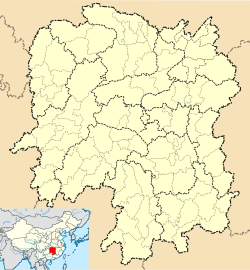Quyang, Hunan
Quyang Town
渠阳镇 | |
|---|---|
| Coordinates: 26°34′32″N 109°42′03″E / 26.575508°N 109.700832°E | |
| Country | People's Republic of China |
| Province | Hunan |
| Prefecture | Huaihua |
| Autonomous county | Jingzhou Miao and Dong Autonomous County |
| Area | |
| • Total | 687.9 km2 (265.6 sq mi) |
| Population (2015) | 118,100 |
| Time zone | UTC+8 (China Standard) |
| Postal code | 418000 |
| Area code | 0745 |
Quyang (simplified Chinese: 渠阳镇; traditional Chinese: 渠陽鎮; pinyin: Qúyáng Zhèn) is an urban town and the county seat of Jingzhou Miao and Dong Autonomous County in Hunan, China. The town is located in the south central region of the county. As of the 2015 census it had a population of 118,100 and an area of 687.9-square-kilometre (265.6 sq mi). Its seat of local government is at Tuqiaojie Community (土桥街社区).[1] The town is bordered to the north by Taiyangping Township, to the northwest by Aoshang Town, to the northeast by Wenxi Township, to the south by Xinchang Town, to the southwest by Outuan Township, and to the west by Sanqiao Township.[2]
History
[edit]It was reformed to merge Pukpou Township (铺口乡), Hengjiangqiao Township (横江桥乡) and the former Quyang Town on November 25, 2015.[3]
Administrative division
[edit]As of 2015, the town is divided into 8 communities and 61 villages.[3]
Geography
[edit]There are a number of popular mountains located immediately adjacent to the townsite which include Mount Qingdian (青靛山; 1,173-metre (3,848 ft)); Mount Fei (飞山; 720-metre (2,360 ft)); Mount Fengmu (枫木山; 998-metre (3,274 ft)); Mount Wubaijiao (五佰角; 693-metre (2,274 ft)); Mount Dalaogu (大老古; 888-metre (2,913 ft)) and Mount Mayipo (蚂蚁坡; 708-metre (2,323 ft)).[4]
There are 27 reservoirs in the town, such as Shuiniangtang Reservoir, Ma'andong Reservoir, Jinmai Reservoir, and Feishan Reservoir.[4]
There are two major rivers flow through the town, namely Diling River (地灵河) and Qushui River (渠水).[4]
Economy
[edit]The local economy is primarily based upon agriculture, mineral resources and local industry. The region abounds with manganese and alum.
Transport
[edit]The National Highway G209 and G65 Baotou–Maoming Expressway pass across the town south to north.[2]
The Provincial Highway S222 passes across the town west to east.[2]
The Provincial Highway S221 terminates at the town.[2]
The Jiaozuo–Liuzhou railway passes across the town north to south.[2]
References
[edit]- ^ 湖南省民政厅关于同意靖州苗族侗族自治县乡镇区划调整方案的批复》(湘民行发〔2015〕80号). rednet.cn. 2015-12-04.
- ^ a b c d e Zhang Hong, ed. (2018). "Jingzhou Miao and Dong Autonomous County" 《靖州苗族侗族自治县》. 《中国分省系列地图册:湖南》 [Maps of Provinces in China: Hunan] (in Chinese). Xicheng District, Beijing: SinoMaps Press. pp. 166–167. ISBN 978-7-5031-8949-4.
- ^ a b 怀化撤并93个乡镇,你家乡变了没 [Huaihua abolished and merged 93 townships, has your hometown changed?]. hunan.voc.com.cn (in Chinese). 3 December 2015.
- ^ a b c Pan Rongjian, ed. (2009). "Map of Jingzhou Miao and Dong Autonomous County" 《靖州苗族侗族自治县地图》. 《靖州苗族侗族自治县概况》 [General Situation of Jingzhou Miao and Dong Autonomous County] (in Chinese). Beijing: Nationalities Publishing House. p. 1. ISBN 978-7-105-08631-3.

